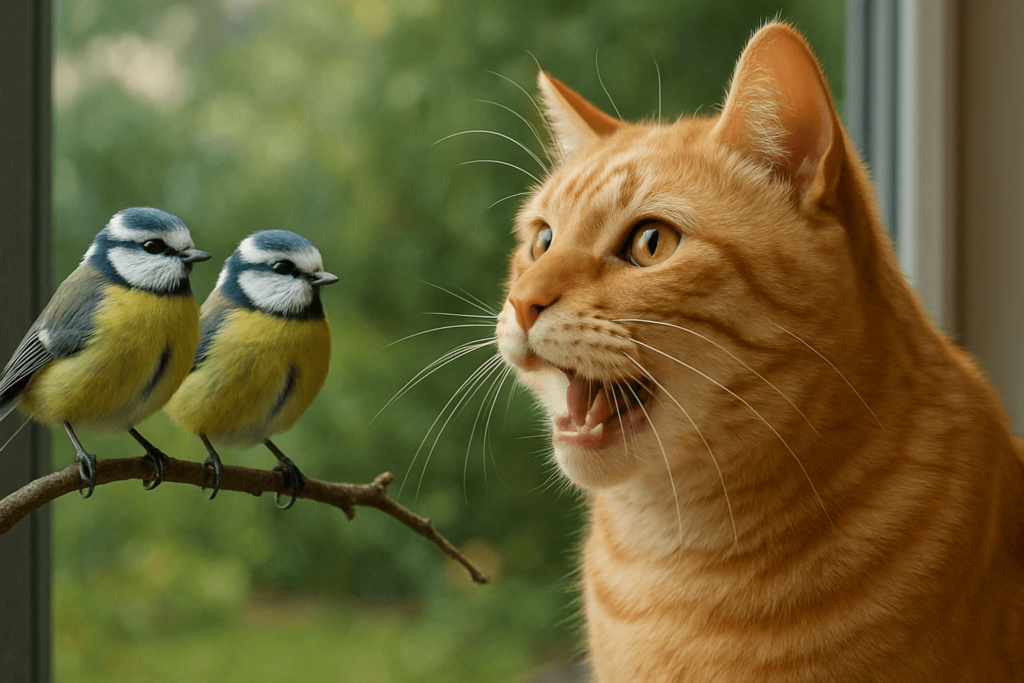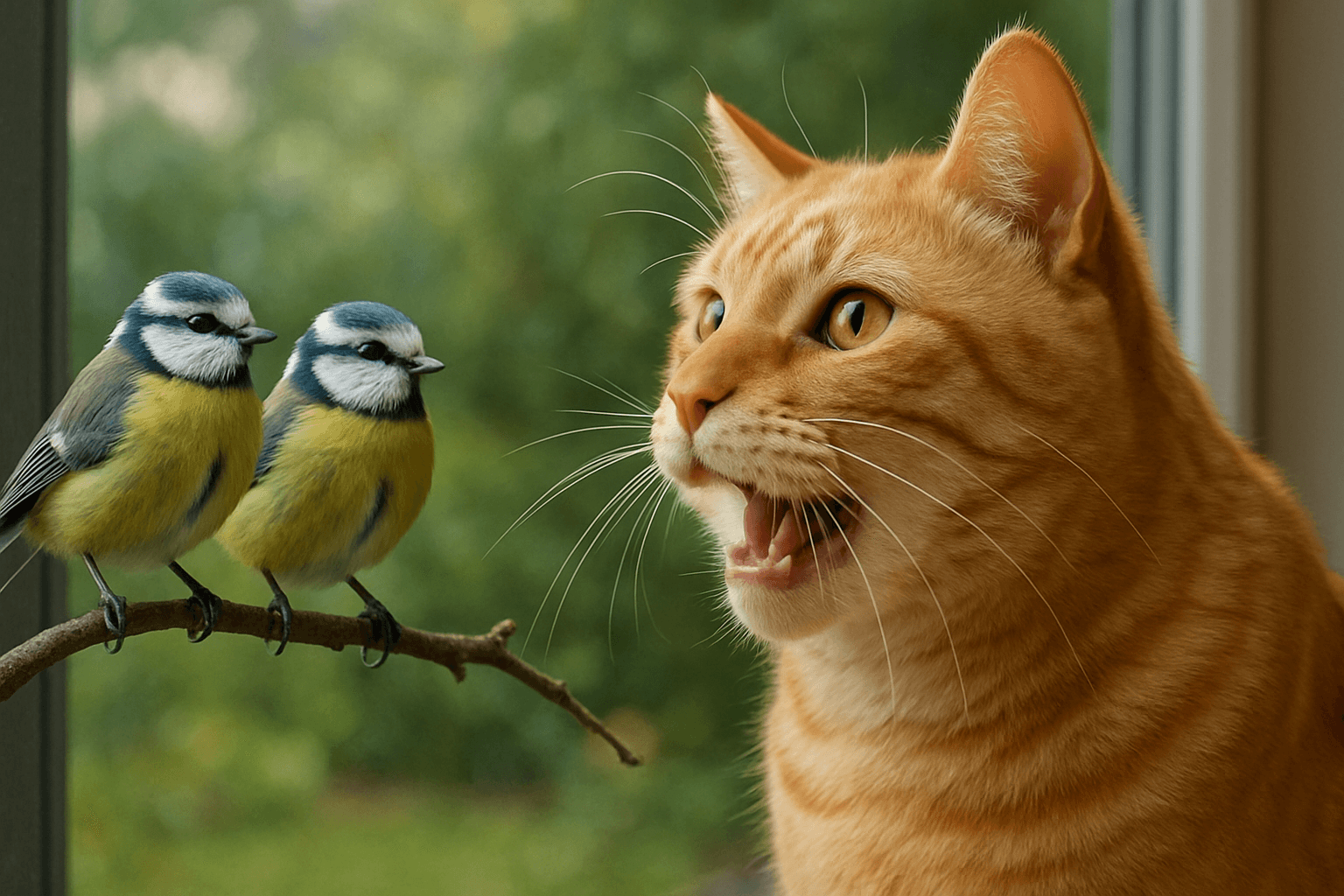Why Does My Cat Chirp at Birds?
If you’ve ever caught your cat staring intently out the window, emitting a series of strange chirping or chattering sounds, you’re not alone. This quirky behavior is common among felines and often directed at birds or other small prey animals they spot outside. But what exactly is going on when your cat chirps at birds? Is it excitement, frustration, or something else entirely? Understanding this unique vocalization can help you better connect with your furry friend and appreciate their natural instincts. Let’s dive into the fascinating world of cat chirps and uncover the reasons behind this adorable yet mysterious behavior.
Reasons Why Cats Chirp at Birds
Cats are hunters by nature, and their chirping behavior often stems from their instinctual drive to stalk and capture prey. Here are some key explanations for why your cat might be chirping at birds.
Excitement and Anticipation:
Spotting a bird triggers your cat’s hunting instincts, and the chirping sound may express their excitement and readiness to pounce.Frustration from Being Unable to Reach Prey:
When cats see birds but can’t physically reach them—like through a window—they may chirp out of frustration or impatience.Mimicking Bird Sounds:
Some experts believe cats mimic bird noises as part of their hunting strategy, perhaps to confuse or lure their prey closer.Vocalizing Their Focus:
Chirping could simply be a way for cats to vocalize their intense focus and concentration while watching birds.Reliving Past Hunting Experiences:
For indoor cats, chirping might serve as a substitute for actual hunting, allowing them to “act out” what they would do if they were outside.
These reasons highlight how deeply ingrained hunting behaviors are in domestic cats, even when they live comfortable, indoor lives.

What Your Cat’s Chirping Behavior Reveals About Their Personality
A cat’s chirping at birds isn’t just about instinct—it can also provide insight into their personality and emotional state. Observing this behavior closely helps you understand your pet better.
High Energy Levels:
Cats that chirp frequently tend to have higher energy levels and may need more playtime or mental stimulation to stay entertained.Curiosity and Intelligence:
Chirping suggests your cat is highly observant and curious about the world around them, traits often linked to intelligence.Playful Nature:
If your cat chirps excitedly, it could indicate they enjoy interactive toys or games that simulate hunting scenarios.Emotional Expression:
Some cats use chirping as a form of communication, expressing joy, excitement, or even mild annoyance.Connection to Wild Instincts:
Chirping shows that despite being domesticated, cats still retain many wild instincts, which shape their daily behaviors.
Understanding these nuances strengthens the bond between you and your cat, helping you cater to their needs more effectively.
Check this guide 👉Understanding Why Cats Swish Their Tails: Best 7 Expert Tips
Check this guide 👉Understanding Why Cats Arch Their Backs: Best 7 Expert Tips!
Check this guide 👉Why Cats Love to Lay Down: Best 7 Expert Tips!
Behavioral Traits Linked to Chirping | How to Respond as an Owner |
|---|---|
Excited chirping at birds | Provide interactive toys like feather wands |
Frustrated chirping due to barriers | Create safe outdoor spaces (e.g., catio) |
Mimicking bird sounds | Introduce puzzle feeders for mental enrichment |
Vocalizing during focused observation | Engage in play sessions mimicking hunting |
Reliving hunting instincts | Rotate toys regularly to keep interest fresh |
How to Redirect Your Cat’s Chirping Behavior Indoors
While chirping is a natural behavior, there are ways to redirect your cat’s energy constructive ways. These tips ensure your cat stays happy and engaged without becoming overly fixated on birds outside.
Provide Interactive Toys:
Toys like laser pointers or feather wands simulate hunting and satisfy your cat’s predatory instincts indoors.Set Up a Bird Feeder Near the Window:
Placing a feeder where your cat can see it safely allows them to observe birds without frustration.Introduce Puzzle Feeders:
Puzzle feeders challenge your cat mentally and physically, reducing boredom and excessive chirping.Create a Catio or Enclosed Space:
A secure outdoor enclosure lets your cat experience the sights and sounds of nature up close without danger.Engage in Regular Play Sessions:
Daily playtime helps burn off excess energy and reduces obsessive behaviors like constant chirping.
By providing enriching alternatives, you can channel your cat’s instincts into positive activities.
Signs That Chirping Indicates Stress or Anxiety
While chirping is usually harmless, it can sometimes signal underlying stress or anxiety in cats. Recognizing these signs ensures your cat remains healthy and content.
Excessive Chirping Beyond Normal Levels:
If your cat chirps nonstop throughout the day, it might indicate heightened anxiety or overstimulation.Aggressive Behavior Toward Windows:
Pawing aggressively at windows or glass could suggest frustration or territorial feelings.Changes in Eating or Sleeping Habits:
Stress-related chirping may coincide with changes in appetite or disrupted sleep patterns.Overgrooming or Other Compulsive Behaviors:
Cats under stress may groom excessively or engage in repetitive actions alongside increased chirping.Increased Vocalization at Night:
Chirping combined with nighttime meowing could point to loneliness or anxiety during quiet hours.
Addressing potential stressors early ensures your cat feels calm and secure in their environment.
Fun Facts About Cat Chirping
Cat chirping is more than just a random sound—it has intriguing aspects worth exploring. Here are some fun facts about this behavior.
Chirping Mimics Prey Communication:
Some scientists believe cats chirp to imitate bird calls, possibly as a tactic to draw prey closer.It’s Seen in Big Cats Too:
Larger felines like cougars and leopards also exhibit similar vocalizations when stalking prey.Unique to Each Cat:
Every cat has its own style of chirping, influenced by personality and breed characteristics.Linked to Jaw Movement:
The chirping sound is often accompanied by rapid jaw movements, known as “chattering,” which may stimulate saliva production for digestion.More Common in Indoor Cats:
Indoor cats tend to chirp more since they encounter fewer opportunities to act on their hunting instincts.
These insights add depth to our understanding of this charming feline trait.
How to Safely Stimulate Your Cat’s Hunting Instincts
Engaging your cat’s hunting instincts safely is key to keeping them entertained and preventing frustration. Here’s how to do it effectively.
Use Wand Toys with Feathers:
Feathered toys mimic birds’ movements and tap into your cat’s natural desire to chase and pounce.Incorporate Food Dispensing Toys:
Treat-dispensing toys encourage problem-solving and reward your cat for their efforts.Rotate Toys Regularly:
Keeping toys fresh prevents boredom and maintains your cat’s interest over time.Simulate Realistic Movements:
Move toys unpredictably to mimic the erratic motions of real prey, making playtime more engaging.End Play Sessions with a Reward:
Giving your cat a treat or praise after play reinforces positive associations with hunting-like activities.
By simulating realistic scenarios, you can fulfill your cat’s instincts in a controlled, enjoyable way.
Tips for Managing Window-Watching Behavior
Window-watching is a favorite pastime for many cats, but it can lead to excessive chirping or frustration. These tips help manage this behavior constructively.
Install a Bird Feeder Nearby:
Positioning a feeder near your window gives your cat a front-row seat to birdwatching action without stress.Use Frosted Window Film:
Applying frosted film reduces visibility slightly, discouraging obsessive staring while still allowing light in.Limit Access During Peak Hours:
Restrict access to windows during times when birds are most active, such as dawn and dusk.Redirect Attention with Toys:
Distract your cat with interactive toys whenever they start fixating too much on birds outside.Teach Calm Behavior:
Reward your cat with treats or affection when they remain calm instead of chirping loudly at the window.
With thoughtful management, you can turn window-watching into a positive experience for both you and your cat.
Frequently Asked Questions About Cat Chirping
Is it normal for my cat to chirp at birds?
Yes, chirping is a normal behavior rooted in hunting instincts and curiosity.
Should I stop my cat from chirping?
No, chirping is natural, but you can redirect their energy with toys or activities if needed.
Can chirping hurt my cat?
Chirping itself isn’t harmful, but excessive vocalizations might indicate stress or boredom.
Do all cats chirp at birds?
Not all cats chirp, but most will exhibit some form of vocalization when observing prey.
How can I reduce my cat’s obsession with birds?
Use interactive toys, puzzle feeders, and environmental enrichment to distract and engage your cat.
Celebrating Your Cat’s Unique Chirping Behavior
Chirping at birds is one of the many endearing quirks that make cats such fascinating companions. Rooted in their innate hunting instincts, this behavior reflects their connection to the wild world, even within the comfort of our homes. By understanding and embracing your cat’s chirping tendencies—and providing outlets for their energy—you can enhance their well-being while strengthening your bond. Whether it’s through play, interactive toys, or simply admiring their antics, appreciating this behavior adds another layer of joy to life with your feline friend.
Canned Pumpkin for Cat Diarrhea: Best 7 Expert Tips! Natural remedy to firm stools, soothe upset bellies, and support gut health safely.
Can a Cat Give You Scabies? Best 7 Expert Tips! Discover the truth about feline mites, human skin risks, and how to protect yourself—without panic.
Cat Flea vs Human Flea: Best 7 Expert Tips! Discover the truth about bites, species, and how to eliminate infestations for good.
Weird Cat Behaviors: Best 7 Expert Tips! Discover why cats do strange things—and how to understand, not punish, their instincts for a happier home.





